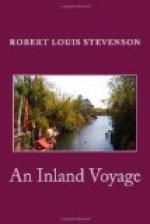It is almost unnecessary to mention that when lunch was over and we got aboard again and made sail, the wind promptly died away. The rest of the journey to Villevorde, we still spread our canvas to the unfavouring air; and with now and then a puff, and now and then a spell of paddling, drifted along from lock to lock, between the orderly trees.
It was a fine, green, fat landscape; or rather a mere green water-lane, going on from village to village. Things had a settled look, as in places long lived in. Crop-headed children spat upon us from the bridges as we went below, with a true conservative feeling. But even more conservative were the fishermen, intent upon their floats, who let us go by without one glance. They perched upon sterlings and buttresses and along the slope of the embankment, gently occupied. They were indifferent, like pieces of dead nature. They did not move any more than if they had been fishing in an old Dutch print. The leaves fluttered, the water lapped, but they continued in one stay like so many churches established by law. You might have trepanned every one of their innocent heads, and found no more than so much coiled fishing-line below their skulls. I do not care for your stalwart fellows in india-rubber stockings breasting up mountain torrents with a salmon rod; but I do dearly love the class of man who plies his unfruitful art, for ever and a day, by still and depopulated waters.
At the last lock, just beyond Villevorde, there was a lock-mistress who spoke French comprehensibly, and told us we were still a couple of leagues from Brussels. At the same place, the rain began again. It fell in straight, parallel lines; and the surface of the canal was thrown up into an infinity of little crystal fountains. There were no beds to be had in the neighbourhood. Nothing for it but to lay the sails aside and address ourselves to steady paddling in the rain.




